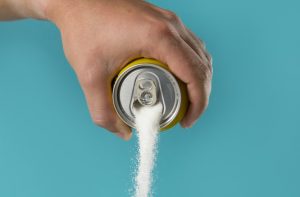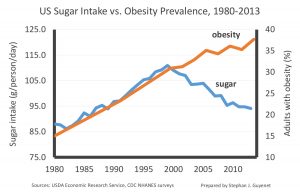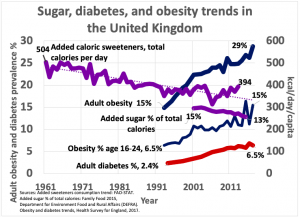If you read or watch the news, you’ll know that sugar gets a bad rap. But is sugar really fattening? In this post, we take a look at whether sugar really does make you fat.
Is Sugar Really Fattening?
As of late, sugar is the current culprit for the obesity epidemic. Now that we’ve decided fat isn’t to blame, it must be something, right? Obesity is still steadily on the rise, and it always seems easier to justify a single cause. As you probably notice, there’s a growing promotion of Ketogenic or low carb diets. These are based on the idea of cutting out carbohydrate, including sugar. The premise of such diets is that sugar is causing people to put on fat.

Some claim that the ketogenic diet is more effective for fat loss, due to the removal of sugar and other carbohydrates. But such claims are anecdotal, with little scientific evidence to back them up. A recent nutrition podcast hosted by Joe Rogan, alongside Gary Taubes & Stephan Guyenet (#1267) exemplified this. This podcast featured a debate on the effects of sugar. In this debate, it was argued that avoiding sugar could be the cure to obesity. However, in response, a scientist makes the point that there’s just not enough research to back up this claim. In fact, the only scientific evidence quoted in the podcast suggested that sugar is not likely to be the cause of obesity at all.
So, is sugar really fattening? I’m not here to tell you sugar is excellent for you. However, this article breaks down why sugar alone won’t make you fat. So, let’s get into the truth of it!
Sugar, or Empty Calories?
Scientific reviews have begun to ask the question ‘is sugar really fattening?’. The consensus is that research does not prove that eating sugar makes us fat (Kaiser et al., 2013).

This being said, several studies show that reducing the intake of sugar-sweetened drinks will reduce a person’s weight (Hu, 2013, Charvet & Huffman, 2019). Unfortunately, though, this doesn’t prove that sugar is what makes people fat. It is true that sweetened drinks increase the amount of sugar in a person’s diet. However, often overlooked is the fact that these drinks also increase the number of ’empty’ calories we eat. So, does the increase in weight arise because of the sugar, or the easily added calories that don’t satiate us?
Let’s now look at more evidence comparing sugar consumption and rates of obesity.
Carbohydrates, Sugar, and Rates of Obesity
Believe it or not, sugar consumption as a whole has been declining over the last 10-20 years (Miller & Barclay 2017, Welsh et al., 2011, Powell et al., 2016). In places like Australia and the USA, studies show drops of 15-22% across the board. However, obesity has steadily been on the rise throughout.

Similarly, in the UK, there’s been a decline in the amount of added sugar consumed over the last 50 years. This has steadily dropped by 22% (Family Food Survey, 2015), with a 15% decrease in the last 15-20 years. So, is sugar really fattening? Let’s look at the figures for obesity in the UK to find out. Again, despite us eating less added sugar, obesity has been on a steady rise. Ironically, that rise of 15% is the same as the decline in added sugar consumption.

Even sugary drinks sales as a whole have been on a steady decline over the years. Added sugar tax in the UK and US have diminished sales further. So how is sugar really fattening, if we are eating less of it while obesity is still rising? One potential answer to this question could be to do with sugar’s effect on insulin. Let’s now delve into whether there is any truth in this.
Sugar and Insulin
Some claim that sugar triggers insulin, which makes it fattening. From a scientific perspective, there is no substantial evidence to back up this claim. When looking overall at how insulin levels and resistance impact weight change over time, there is little proof that either is linked with future weight gain (Hivert et al., 2007).

Insulin response is also highly individual, as we all have different responses to food. For example, a particular food may spike your insulin higher than it would someone else’s. Unfortunately, we aren’t all created equal. Therefore different foods have different responses from your hormones, gut microbiome, and brain. In medical and nutritional fields this is a growing subject because researchers are noticing that certain foods impact individuals differently (Zeevi et al., 2015). So, is sugar really fattening? The fact is, categorising one group of foods as bad for everyone based on insulin response is near on impossible.
Sugar and Exercise
Looking at exercise and it’s interaction with sugar intake, it is even more apparent that there is no clear answer to the question ‘is sugar really fattening?’. For sedentary individuals, consuming a lot of sugar can have adverse effects, such as metabolic and psychiatric disturbances. However, the influence of exercise creates a very different reaction. Codella et al., (2017) reviewed the literature surrounding the possible health risks of sugar and the mild correlation to addictive tendencies. In short, they found that regular exercise counteracts any risks that sedentary populations have.

Exercise increases your ability to break down and store carbohydrates, including sugar. For intensive training, the body’s primary source of energy is glycogen. Where do we get glycogen? Carbohydrates (that includes sugar). The body doesn’t care if it sources glycogen from a potato or a bar of chocolate. Either way, these foods get processed the same and used for energy. The more exercise you do, the more glycogen your muscles store and use during exercise (Areta & Hopkins 2018). So is sugar really fattening? If you exercise, you use sugars and carbohydrates effectively, burning more calories. Therefore sugar is used as fuel by the body, and can even be beneficial.
Final Note
When it comes to sugar, we aren’t saying you need to have it, or that it has magical health benefits. But is sugar really fattening? Current scientific evidence does not show that sugar directly causes weight gain. Adherence is the most critical factor in any diet. Whether including sugar or not, focus on a strategy that you can stick to. We are all individual, and many factors can influence our reaction to foods. However, a good diet that you can sustain will always beat a perfect diet which fails!
